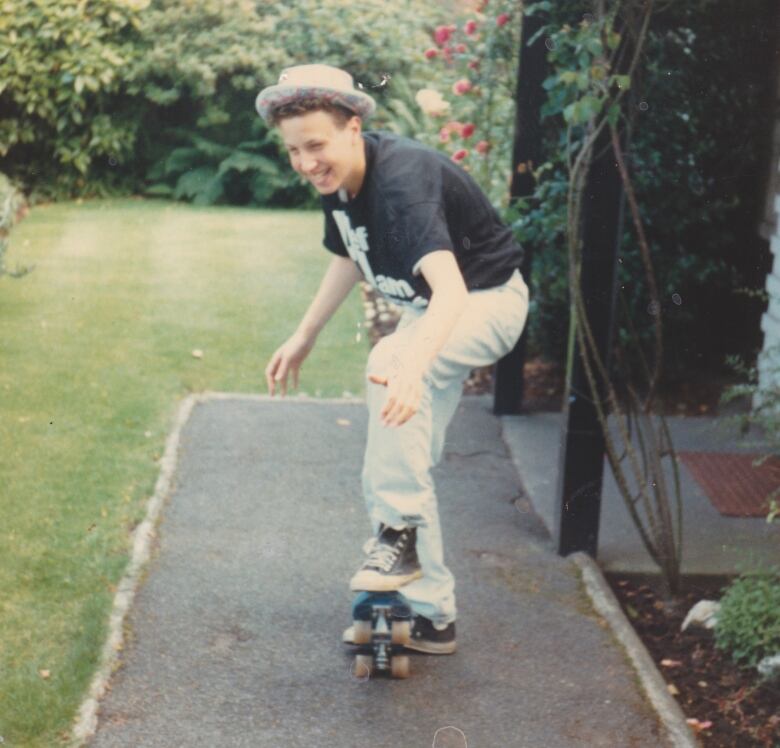British soccer commentator Roger Bennett's new memoir is an ode to American culture and his 'chosen home'
As a teen, Bennett long dreamed of escaping Liverpool, England for the U.S.


Roger Bennett knew it was time to leave his hometown of Liverpool, England when Beastie Boys fans rioted in the streets.
It was the late '80s and the band was touring the U.K., riding high on the success of their debut album Licensed To Ill. The group took to the stage in Liverpool and from the start, it was chaos, recalled Bennett, who is now a soccer commentator and podcaster.
Though he had long dreamed of moving to the United States, it was that night which would cement his decision.
"The city was absolutely buzzing the night they arrived. Everybody was dressed up like a b-boy…. I mean, the excitement level was at 11 and this was going to be our Woodstock," he told Day 6 host Brent Bambury.
"But then MCA [group member Adam Yauch] made the mistake of, offstage before coming on, screaming 'F--- you, Liverpool!' which I guess was their shtick. And it worked in L.A., Cincinnati, Birmingham or Manchester, but you don't do that in Liverpool. That's fighting talk."
To many in the crowd — himself included — the Beastie Boys were "heroes," Bennett said. But before the group even wrapped their first number, the crowd had forced them off-stage.
A riot broke out, and police threw tear gas into the crowd, he recalled. The scene became violent.

"There's an old saying in England: If you give an Englishman the choice between his success and your failure, he'll choose your failure every time," Bennett said.
"Rather than have a night that we'll remember forever, we decided to bring our heroes down to our level — and that was the night I realized I needed to get out."
Bennett details his journey from the U.K., to his new stateside home in his new memoir, (Re)Born in the USA: An Englishman's Love Letter to his Chosen Home.
Liverpool was 'really dark'
Bennett grew up in a downtrodden Liverpool. The city's main industries were shutting down, and unemployment ran rampant. Margaret Thatcher was prime minister, to the disappointment of the largely working-class population. "It was really dark," he said.
"I survived by looking towards North America, and just imbibing every bit of culture that Canada, the United States sent our way."
As he tells it, his family was never meant to land in Liverpool. His grandfather, a kosher butcher, had left Ukraine in the early 1900s with his sights set on Chicago.
When the ship docked in Liverpool, the family's destiny seemingly changed.
"The joke of our family, which is actually true, is that when the boat docked to refuel in Liverpool, he saw the one tall building on the Liverpool skyline, pointed at it and thought he was in New York City and got off the boat at the wrong stop," Bennett said.
Bennett would eventually decide to complete that journey after a pen pal in Chicago offered his first trip across the pond.

It was 1986, the year the Chicago Bears won the Super Bowl, and an incredible time to visit the city, Bennett said.
"My pen pal said come over, spend the summer on the beach in the northern suburbs of Chicago — the same canvas that John Hughes had bloody used for each of [his] movies," he told Bambury.
"I convinced myself through what happened there, that that was the place I was going to move to."
American idea, not American reality
Bennett is now based in New York City, a city he had painted on his bedroom walls growing up.
"It's a terrible representation. It looks more like Warsaw, but in my eye, it was Manhattan, and then I ended up moving there and making my dream come true," he said.
He's now married to an American woman, and together the couple has four kids — who all speak with a Manhattan accent.
Asked whether it feels "strange" to write a love letter to America at a time it is facing significant political and cultural upheaval, Bennett says he was inspired to reflect on history.
The book was written during the pandemic, as COVID-19 raged throughout Manhattan.
"When the present is filled with chaos and uncertainty and fear, I think it's a natural human emotion to revert to the past," he said.
"What I wanted to do was to take the idea of America, which is the central idea around which I organize my life. I've moved here and made my family's three-generation dream come true."
The American idea, he argues, is different from the American reality, and that is the "spirit" of the memoir.
"I think the most important part of the book is really the epigraph, which is a funny part of any book because you're using someone else's words to almost better your own," Bennett said.
"It was an honour for me to open the book with the words of the great American poet Langston Hughes when he said, 'Oh, let America be America again. The land that never has been yet and yet must be.'"
Written by Jason Vermes. Produced by Pedro Sanchez.
Hear full episodes of Day 6 on CBC Listen, our free audio streaming service.
